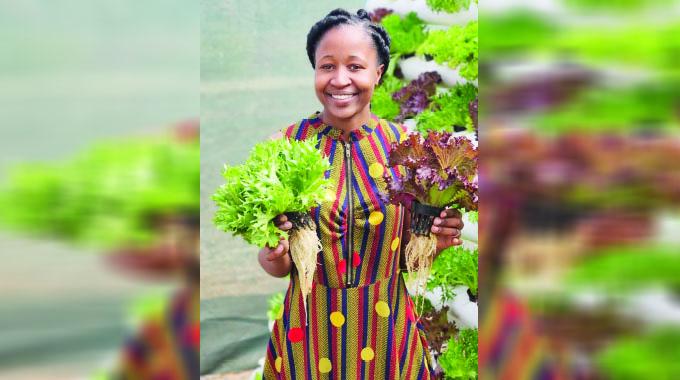News / National
Bulawayo woman thrives with hydroponic farm
28 Apr 2025 at 11:26hrs |
0 Views

A young female entrepreneur in Bulawayo is turning heads with her innovative approach to farming, using hydroponic technology to grow lettuce and strawberries at her family home in Waterford suburb. Hydroponics, a method of growing plants without soil by using water-based mineral nutrient solutions, has become the foundation of her thriving business and is offering hope to young aspiring farmers.
Ms. Ntombifikile Ncube has transformed her backyard into a flourishing greenhouse, utilizing smart farming techniques to grow her crops. She recently invited visitors to tour her greenhouse, where both strawberries and lettuce are in full bloom and expected to be ready for harvest by early May.
"This method has huge potential, especially for young people passionate about farming but without access to large plots of land," Ms. Ncube said, explaining how hydroponics requires much less space compared to traditional farming methods.
To help others adopt this modern farming technique, Ms. Ncube has established a company dedicated to training young individuals in hydroponic farming and assisting them in setting up their own systems.
Despite her success, Ms. Ncube acknowledges that there are challenges in the market, particularly with consumers who remain sceptical of hydroponically grown crops. "People often say it's full of GMOs, but that's simply not true. All the nutrients we use are organic," she said.
Ms. Ncube emphasized that the process involves adding nutrients to water in PVC pipes, which is then used to cultivate crops. The nutrients can either be purchased from agricultural supply shops or made at home. The method, she says, produces crops that are not only eco-friendly but also richer in nutrients compared to those grown in soil.
"The good thing about hydroponics is that it uses significantly less water than traditional farming," she added. "With Bulawayo's ongoing water-shedding schedule, hydroponics has proven to be a viable solution."
Her previous crop cycle was a success, and Ms. Ncube managed to sell her produce to a variety of markets. She even explored value addition by creating strawberry shakes, further expanding her product line.
A developmental practitioner by profession, Ms. Ncube's interest in farming started during her third year at university when she struggled to secure an internship. "That was an eye-opener for me. I thought, if I'm struggling to get an attachment, what are the chances of landing a job? That's when I started researching alternative ways to earn an income," she shared.
Her hydroponic farming venture took off after receiving training from a non-governmental organization. After submitting a strong business proposal, she was awarded a grant that helped her kick-start her project. "It's quite expensive to start, you need close to US$3,000 to set up. But once it's up and running, the profits are worthwhile," she explained.
Beyond financial success, Ms. Ncube has had the opportunity to travel internationally to share ideas with fellow hydroponic farmers and learn from their experiences. "This kind of farming is the future. It has the potential to save land and is more cost-effective, especially considering how expensive land has become," she said.
Ms. Ncube's journey is a testament to how innovation and determination can open doors to new opportunities, inspiring young Zimbabweans to explore sustainable farming solutions for the future.
Ms. Ntombifikile Ncube has transformed her backyard into a flourishing greenhouse, utilizing smart farming techniques to grow her crops. She recently invited visitors to tour her greenhouse, where both strawberries and lettuce are in full bloom and expected to be ready for harvest by early May.
"This method has huge potential, especially for young people passionate about farming but without access to large plots of land," Ms. Ncube said, explaining how hydroponics requires much less space compared to traditional farming methods.
To help others adopt this modern farming technique, Ms. Ncube has established a company dedicated to training young individuals in hydroponic farming and assisting them in setting up their own systems.
Despite her success, Ms. Ncube acknowledges that there are challenges in the market, particularly with consumers who remain sceptical of hydroponically grown crops. "People often say it's full of GMOs, but that's simply not true. All the nutrients we use are organic," she said.
Ms. Ncube emphasized that the process involves adding nutrients to water in PVC pipes, which is then used to cultivate crops. The nutrients can either be purchased from agricultural supply shops or made at home. The method, she says, produces crops that are not only eco-friendly but also richer in nutrients compared to those grown in soil.
Her previous crop cycle was a success, and Ms. Ncube managed to sell her produce to a variety of markets. She even explored value addition by creating strawberry shakes, further expanding her product line.
A developmental practitioner by profession, Ms. Ncube's interest in farming started during her third year at university when she struggled to secure an internship. "That was an eye-opener for me. I thought, if I'm struggling to get an attachment, what are the chances of landing a job? That's when I started researching alternative ways to earn an income," she shared.
Her hydroponic farming venture took off after receiving training from a non-governmental organization. After submitting a strong business proposal, she was awarded a grant that helped her kick-start her project. "It's quite expensive to start, you need close to US$3,000 to set up. But once it's up and running, the profits are worthwhile," she explained.
Beyond financial success, Ms. Ncube has had the opportunity to travel internationally to share ideas with fellow hydroponic farmers and learn from their experiences. "This kind of farming is the future. It has the potential to save land and is more cost-effective, especially considering how expensive land has become," she said.
Ms. Ncube's journey is a testament to how innovation and determination can open doors to new opportunities, inspiring young Zimbabweans to explore sustainable farming solutions for the future.
Source - The Sunday News
Join the discussion
Loading comments…
































